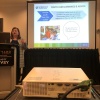Presenter and slide deck
Laura Horodecki - Project Manager, NorWest Co-op Community Health
Key Learnings
- It is important to engage and partner with a variety of community and government agencies in order to collaboratively provide a continuum of services under one roof. NorWest Youth Hub has partnerships with provincial and community partners working in the areas of substance use and addictions, employment support, primary health care, outreach, immigration and settlement support, food security, justice, income assistance, child care, education, and LGBT2SQ+ support.
- Working towards the seamless integration of services can present a multitude of challenges and unexpected hurdles. It is important to remain flexible and develop risk management and mitigation plans to assist in implementing necessary adaptations in response to changes.
- A mixed funding model has great benefits, including supporting sustainability and providing flexibility for innovation. However, it is important that hubs not only collect and report back on mandatory metrics as outlined by funders, but to also develop their own cohesive evaluation plan.
Identified Gaps in Research, Practice, and/or Policy
It is important to understand the local context of your community (e.g., sociodemographic trends, needs, and barriers). Local contextual factors should be used to drive not only the available services, but also the demographics of service providers and the skill sets they are equipped with.
Contact Email of Presenter
Laura Horodecki – lhorodecki@norwestcoop.ca

